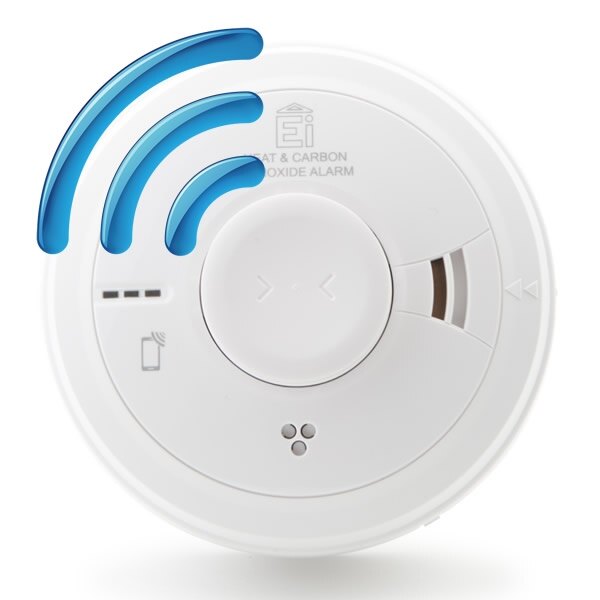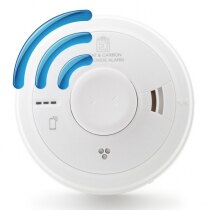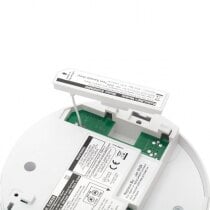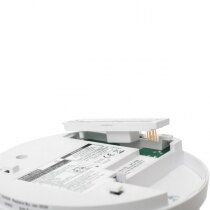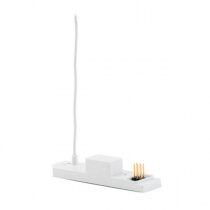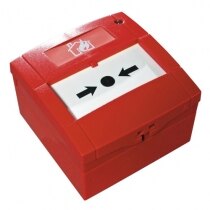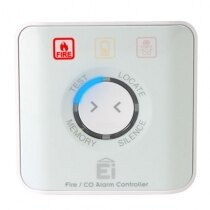-
Contact
Sales & Customer Service
0800 612 6537 support@safelincs.co.uk Live ChatDelivery Enquiries
0800 077 6149 - Resources
Fire & Safety Solutions
CALL OUR TEAM NOW 0800 612 6537
Lines open today 8am - 6pm
Quick Delivery
From £3.19 inc VAT
Secure Payments
with our fast checkout
Live Customer Chat
Available Now
30 Day Accounts
for Public Sector
5 Star Customer Feedback
Mains Radio-Interlinked Combined Heat and Carbon Monoxide Alarm with Self-Charging 10 Year Back-up - Aico Ei3028RF
Product Overview
Interlink
Technical Data
FAQs (2)
Suitable for kitchen and garage installations, the Ei3028RF is a mains powered, multi-sensor, heat and carbon monoxide alarm with a built-in, rechargeable lithium back-up battery. Complete with AudioLINK technology, this alarm allows you to extract real time data from the alarm directly to a smart phone. The alarm is fitted with a high performance heat and electrochemical sensor to provide protection from both fire and CO in one alarm. Also supplied with a Ei3000MRF SmartLINK module, which allows for hybrid (wired or wireless) interlinking with up to 12 compatible devices, the alarm features a combined test and silence button to facilitate frequent testing of the alarm and system.
- Product Lifespan: 10 years
- Power: 230V mains powered with battery backup
- Backup Battery: Re-chargeable lithium battery
- Warranty: 5 year warranty
- Suitable for ceiling installation
- Contains both a heat and electrochemical carbon monoxide sensor
- Suitable for kitchen and garage installations
- Real time data extraction to a smart phone via AudioLINK
- 85dB warning alarm at 3m
- Different alarm sounds based on which sensor has been triggered
- This bundle includes the Ei3028 Heat and CO Alarm and separate Ei3000MRF SmartLINK module
- Hybrid (wired or wireless) interlinking with up to 12 compatible devices
- CE and Kitemarked to BS 5446-2: 2003 and BS EN 50291-1
- Supplied with Ei3000MRF SmartLINK module for radio-interlinking devices
- Large combined test and silence button
- Memory Feature - allows previously activated alarms to be easily identified
- Suitable for BS 5839-6: 2019 Grade D1 installations
- Supplied with an Easi-fit baseplate
- This alarm is also suitable for both the Welsh and Scottish updated 2022 legislation
The table below shows all the units that can interlink with the Ei3028RF.
Smoke and Heat Alarms - Radio
|
Model Number
|
Type of Unit
|
Type of Interlink
|
| Ei3014 / Ei3014RF | Mains Powered Heat Alarm - Sealed Lithium | Hardwire or Radio Interlink |
| Ei3016 / Ei3016RF | Mains Powered Optical Smoke Alarm - Sealed Lithium | Hardwire or Radio Interlink |
| Ei3024 / Ei3024RF | Mains Powered Optical & Heat Alarm - Sealed Lithium | Hardwire or Radio Interlink |
| Ei3028 / Ei3028RF | Mains Powered Heat & Carbon Monoxide Alarm - Sealed Lithium | Hardwire or Radio Interlink |
| Ei2110e / Ei2110eRF | Mains Powered Multi Sensor Smoke & Heat Alarm - Sealed Lithium | Hardwire or Radio Interlink |
| Ei161e / Ei161eRF | Mains Powered Ionisation Smoke Alarm - Sealed Lithium | Hardwire or Radio Interlink |
| Ei164e / Ei164eRF | Mains Powered Heat Alarm - Sealed Lithium | Hardwire or Radio Interlink |
| Ei166e / Ei166eRF | Mains Powered Optical Smoke Alarm - Sealed Lithium | Hardwire or Radio Interlink |
| Ei141 / Ei168RC141RC | Mains Powered Ionisation Alarm - 9V Alkaline | Hardwire or Radio Interlink |
| Ei144 / Ei168RC144RC | Mains Powered Heat Alarm - 9V Alkaline | Hardwire or Radio Interlink |
| Ei146 / Ei168RC146RC | Mains Powered Optical Smoke Alarm - 9V Alkaline | Hardwire or Radio Interlink |
| Ei3100RF | Battery Powered Ionisation Smoke Alarm - 9V Alkaline | Radio Interlink |
| Ei3103RF | Battery Powered Heat Alarm - 9V Alkaline | Radio Interlink |
| Ei3105RF | Battery Powered Optical Smoke Alarm - 9V Alkaline | Radio Interlink |
| Ei603RF | Battery Powered Heat Alarm - Sealed Lithium | Radio Interlink |
| Ei650RF | Battery Powered Optical Smoke Alarm - Sealed Lithium | Radio Interlink |
Carbon Monoxide Alarms
|
Model Number
|
Type of unit
|
Type of interlink
|
| Ei3018 / Ei3018RF | Mains Powered Carbon Monoxide Alarm - Sealed Lithium | Hardwire or Radio Interlink |
| Ei3028 / Ei3028RF | Mains Powered Heat & Carbon Monoxide Alarm - Sealed Lithium | Hardwire or Radio Interlink |
| Ei262 | Mains Powered Carbon Monoxide Alarm - Sealed Lithium | Hardwire or Radio Interlink |
| Ei261 | Mains Powered Carbon Monoxide Alarm - Sealed Lithium | Hardwire Interlink |
| Ei208WRF | Battery Powered Carbon Monoxide Detector - Sealed Lithium | Radio Iinterlink |
Ancillary Products
|
Model Number
|
Type of unit
|
Type of interlink
|
| Ei170RF | Mains Powered Strobe and Vibration Pad for the Hearing Impaired - Sealed Lithium | Radio Interlink |
| Ei407 | Battery Powered Manual Call Point - Sealed Lithium | Radio Interlink |
| MCP401RC | Mains Powered Manual Call Point | Hardwire Interlink |
| Ei450 | Battery Powered Fire and CO Alarm Controller - Sealed Lithium | Radio Interlink |
| Ei411H | Battery Powered Locate, Silence & Test Control Switch - Sealed Lithium | Radio Interlink |
| Ei410TRF | Battery Powered Test Remote - Sealed Lithium | Radio Interlink (Ei3100RF Series) |
| Ei1529RC | Mains Powered Locate, Silence & Test Control Switch | Hardwire Interlink |
| Ei159 | Mains Powered Smoke Alarm Locator Switch | Hardware Interlink |
| Ei428 | Mains Powered 5A Relay Module | Radio Interlink |
| Ei128R | Mains Powered 5A Relay Module | Hardwire Interlink |
| Ei128RBU | Mains Powered 5A Relay Module with Lithium Backup Battery | Hardwire Interlink |
| Y03 | Mains Powered Multi Frequency Sounder | Hardwire Interlink (via relay) |
| SAB300C | Mains Powered Flashing Xenon Strobe (Clear) | Hardwire Interlink (via relay) |
| SAB300R | Mains Powered Flashing Xenon Strobe (Red) | Hardwire Interlink (via relay) |
Wiring Explained
Mains powered Ei Electronics smoke and heat alarms require a 230V AC power supply and up to 12 alarms can be hardwire interlinked in one system.
To obtain a mains power supply, each alarm can be connected to the nearest lighting circuit using 2 core and earth cable with a separate, dedicated interlink cable connecting alarms where applicable. However, if possible it is recommended that any alarms connected via interlink cable are all powered from a dedicated circuit from the distribution board using 3 core and earth cable for safety during maintenance, as the interlink cable will carry power from live alarms on other power circuits. Please see the diagram below:-
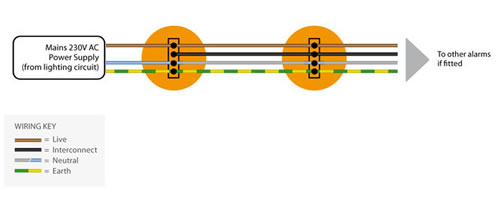
| Product Code | EI3028RF |
|---|---|
| Alternative Product Codes | EI3028, EI3028RF, EI3000MRF |
| Brand | EI Electronics |
| Back-Up Battery | 10 year sealed lithium |
| Dimensions (HxDia) | 66x150mm |
| Operating Temperature | 0°C to 35°C |
| Relative Humidity | 15% to 95% Relative Humidity |
| Sound Output | 85dB |
| Weight | 0.45kg |
| Product Datasheets |
Q. Where should I install my carbon monoxide alarms?
A.
CO detectors should be installed near potential sources of carbon monoxide, essentially any fuel-burning appliances such as boilers, cookers and ovens, fireplaces (both open and enclosed burners), and portable generators. As you are likely to be most affected by CO in areas of your home that you spend the most time in it is advisable to install alarms in those areas as well, such as the living room and bedrooms. It is also worth noting that while one detector is better than no detectors at all, larger homes may require several detectors to cover the property fully.
Also note that carbon monoxide has been proven to spread into neighbouring properties through open windows and, in semi-detached or terrace houses, through loft spaces. If your property has an attached garage with a connecting door through to the house, it is recommended to fit a CO alarm inside the house leading from that doorway.
Battery powered carbon monoxide alarms can typically be installed wall-mounted or left free-standing on flat, level surface.
- Near an appliance: they should be placed within 1 to 3 metres horizontally from the appliance and between the height of the appliance to 150mm below the ceiling – i.e., not above a stove where it would be in the path of steam or fumes.
- In living spaces: they should be positioned close to where the occupant's head is likely to be most of the time – e.g., on your bedside table.
Combined smoke & CO alarms or mains-powered CO alarms are typically installed on the ceiling and should be at least 30cm away from any wall, light fitting, or other obstruction.
Do not install CO alarms within 3 metres of doors or windows, above radiators, or immediately close to anything that gives off steam or fumes like a cooker or shower room. Similarly, it is not recommended to install detectors in dusty areas such as workshops or garages.
For more information, please check the manufacturer's instructions – you can download the PDF manual from the relevant product page on our site. You can also watch our video guide to positioning CO detectors.
Q. Where are carbon monoxide alarms required?
A.
Most legislation advises at least one carbon monoxide alarm is fitted near new or replacement fuel-burning appliances that are fixed installations, though rented properties (both social and private sector) often require CO alarms be provided by landlords even if no appliances are being installed or replaced. Examples include boilers, coal fires, wood burners, and gas ovens and cookers, though an exception is often made in legislation for gas appliances solely used for cooking.
However, any and all materials can give off CO when burning, including gas cookers. Carbon monoxide can also spread from neighbouring properties or outside sources such as vehicle fumes. Because of this, Safelincs strongly recommends the installation of carbon monoxide detectors in every home, and also at head-height in bedrooms to protect occupants while sleeping.
Landlords, please see our pages for English, Welsh, and Scottish alarms or our landlord guidance page for more information.
Pricing & Availability
| Model | Stock | Price |
|---|---|---|
| Product Code: EI3028RF |
Stock Level:
9 in stock Expected dispatch: Today
|
Price:
£135.22 inc VAT £112.68 ex VAT |
Approved Partner
Delivery Options
The following delivery options are available on this product.
Customer Reviews
2 customers have given this product an overall rating of 5 out of 5
Reviews by real customers
All of our product reviews are written by real customers that have purchased this product from us and are published without modification.Rating: 5 / 5 Stars
Reviewed by: I M
Not for the faint hearted professional. This product is superb, but for installation by an unqualified technician,installation is perplexing. I%u2019ve been working with complex electrical diagrams for 50 years , but this item is totally misleading as far as installation is concerned.
Published on: 18th March 2022
Rating: 5 / 5 Stars
Reviewed by: N G
good qiality and reasonble price
Published on: 14th July 2021
Looking for more information?
If you have any questions or would like more information about this product you can ask one of our specialists.
Live Chat Available Now
Direct Telephone
01507 464181




























